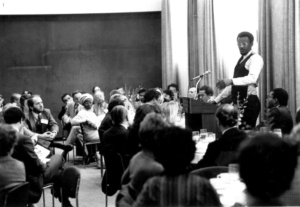
On December 2, just hours after teaching his last class at George Mason University, economist Walter Williams died. He was eighty-four. That same day, I wrote a short appreciation of Walter that led to something unprecedented in my twelve years of blogging: comments by dozens of people, almost none of whom I knew, all complimentary. Our blog, EconLog, is one of the best at weeding out nasty, abusive comments. This time, though, there was nothing to weed out.
It’s easy to see why because Walter was an attractive person in so many ways. He had an inquisitive mind, a powerful work ethic, incredible courage, a great sense of humor, a strong sense of justice, and an ability not just to teach economic understanding but also to sell economic freedom. He did so in hundreds of syndicated columns written over four decades. If you want to understand what was so compelling about the man, you could do no better than read his 2010 autobiography, Up from the Projects. But Walter would have been the first person to remind you that your time is your most valuable resource. So if you’re in a time crunch, read my article instead.
These are the opening two paragraphs of David R. Henderson, “Appreciating Walter Williams,” Defining Ideas, January 22, 2021.
Another excerpt about Walter’s mischievous but also courageous streak:
Walter showed courage and creativity, along with a mischievous streak a mile wide, as a young man dealing with racism. Some of the most impressive and humorous parts of his book are his stories of his time as an Army draftee, from 1959 to 1961, in Georgia and South Korea. At Fort Stewart in Georgia, Walter quickly learned that although the Army was formally desegregated, the best jobs went to white men. When he was assigned to an Army motor pool, he had to wash trucks and jeeps rather than working as a mechanic or mechanic’s helper. A sergeant who caught him reading on the job ordered him to paint a truck. Although Walter knew that the sergeant meant for him to paint the flat bed, he saw his opportunity. “The whole thing?” he asked. The sergeant answered “yes,” but regretted it. After Walter started painting the window and the tires, a lieutenant asked him what the [expletive deleted] he was doing. Walter writes, “I responded, in my best Southern Stepin Fetchit accent, ‘Boss, de sergeant told me to paint de whole truck; Ah’s just doin’ what he say.’ ”
Also, a note about Walter following the logic to wherever it leads:
Walter also followed economic analysis to sometimes surprising conclusions. My favorite example is a 1997 column titled “Extortion or Voluntary Exchange.” In it, he tells of a young woman, Autumn Jackson, who asked Bill Cosby for $40 million “in exchange for her silence about being his illegitimate daughter.” Jackson was convicted of extortion. But Walter points out that she simply offered an exchange that Cosby was free to reject. Walter notes that we should worry about extortion when people threaten violence. If we did, he argues, we would put our attention not on Ms. Jackson, but on the US Congress, which, with legislation, regularly threatens us with violence. He gives the example of Social Security and Medicare. If you don’t pay those taxes, he writes, they will threaten to take our property and/or put us in jail. If we resist, they will authorize their agents to use violence. If Autumn Jackson had offered Cosby such a deal, writes Walter, he would say, “Jail her for life!”
Read the whole thing.


READER COMMENTS
Jon Murphy
Jan 22 2021 at 4:49pm
You wrote:
As I remember him telling us the story, he was convinced that the professors (who were Alchian and Demsetz as I recall) did not care about race, but did care about him. As I recall, Alchian asked Williams to come to his office. Alchian said that Walter knew his stuff, but didn’t understand it and that he and Demsetz would work with him to make sure he passed.
Walter applied those same standards to us students as well. Even after teaching a 3 hour class that got over at 10 PM and facing a long drive home, he would happily remain and discuss this or that element of class that someone was having difficulty. Always one for precision in language, he would patiently explain why his phrasing was more accurate than someone else’s.
He was a wonderful man. I shall miss him very much.
David Henderson
Jan 22 2021 at 5:39pm
Nice story. Thanks.
It reminds me of something Alchian wrote in the margin on one of my exams during my first quarter at UCLA. I said that people would minimize their cost of something. (I don’t remember what.) Alchian pointed out that this had to be wrong because the way to minimize cost was to do zero of the activity. Alchian substituted in the margin the words “economize on,” so that I could see I was making a good point but doing it very badly. What I got out of that was that one can be completely rigorous with zero math.
Re Walter and Alchian, I highly recommend Walter’s book that I reference, if you haven’t already read it. Walter arrived at UCLA at age 29 or 30, versus me coming to a strange state in a slightly strange country at age 21. So Walter had a self-assurance I didn’t. I never would have messed with Alchian in that rascally way that Walter did. His stories about his interactions with Alchian, where Alchian was rascally back at him, are really fun.
Comments are closed.